|
I caught up with
Jimbo Mathus at Carlisle Rock n'Blues Festival when he was on tour
with Ian Siegal.
Alan:
I
understand you were born in Oxford, Mississippi. Did you
grow up there and what were your first musical memories?
Jimbo: Well, I
was born in Oxford but I grew up in two towns, Corinth,
Mississippi which is up on the Tennessee / Alabama line, in
the north-east part of the state, and that's a foothills of
the Appalachians type of region. My mother's family is from
Coahoma County, the Delta so those are the two towns I grew up in. My
father's side were all musicians so I grew up in music my
whole life. My first musical memories are in-utero! I have
literally been hearing it, being around it, learning from it
my whole life and so from my Dad's side I got the white
music, the hillbilly music, the gospel and from my mum's
side, the Clarksdale side, I got the blues and the black
music. I learned first hand from relatives, professionals
and juke joint entertainers.
Alan:
Did you always want to become a musician?
Jimbo: It never
occurred to me to not do that. My first memory was crawling
up on a shelf to get one of the harmonicas and trying the
harmonica and then the first proper instrument was a
mandolin. I started on the mandolin when I was six. The
kids would be out doing things and I would be in there with
the grown-ups just listening and hearing everything. It
just never occurred to me to do anything else.
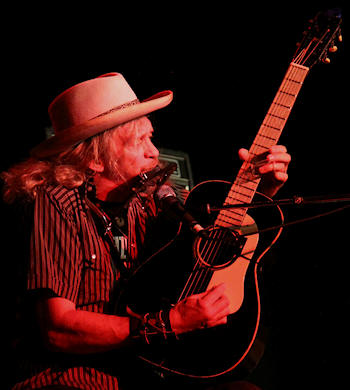 Alan:
How
did you get started professionally? Alan:
How
did you get started professionally?
Jimbo: It
started with Squirrel Nut Zippers, a band I started and that
was the first time I really started getting paid or even
imagining that money would be involved, it just wasn't a
part of my plan. Music was something I did and was
passionate about but it never occurred to me that I would
ever make money at it and I never tried to get a record
deal. I worked my whole life, I was a deckhand, like Alvin
[Youngblood Heart], we worked on the boats, same as Alvin,
he was on the coastguard and I worked for a barge company so
I was a deckhand and could have become a riverboat pilot,
but at that time I was about 21 I decided I was gonna get
off the boats and I'm gonna try to find a place to move
where I can find more people like me, you know, that are
wanting to do original music. I wanted to write, I wanted
to do my own thing, and so I was in my mid 20s before I was
able to realise that I might have a career in my music.
Alan:
Who
were your major musical influences?
Jimbo: If you
take a map of the US and put a nickel on Memphis and you'll
see them all right there between Clarksdale and Jackson,
Tennessee and Memphis and Tupelo. You know, just the canon of
everything from Sam Philips studio, Charlie Patton who is
really my bedrock on the blues, all the Delta musicians, and
of course the hillbilly musicians like Hank Williams, Bill
Monroe, Carter family. These were the things that I played
with my father, my uncles and all that.
Alan:
You
are a multi-instrumentalist, playing guitar, bass, drums,
piano, trombone, mandolin and harmonica. Which is your
favourite instrument?
Jimbo: My
favourite to play is drums, that's the most fun. As you're
engaged with a lot of limbs. I like to sing harmony,
harmony singing is really fun for me, I really enjoy that
but they are all great. The guitar is the thing I've most
stayed on and had the most time on.
Alan:
Getting back to the Squirrel Nut Zippers, that took you
through
the late 1990s and early 2000s.
Jimbo: Yes,
mid, 90s to 2000, about 5 years.
Alan:
That
took you to the second inauguration of Bill Clinton. How
did that come about?
Jimbo: Well we
were a huge band, we were very popular and we were very
quirky and there were multi-generations that liked us,
it was for everybody. Parents could bring their kids, they could bring their
parents and their grandkids. We were just timeless,
entertaining, we had a lot of comedy in there, some cabaret,
it was just a nice act. Bill Clinton liked us and wanted us
there. We performed on Sesame Street, we performed at the
Olympics in Atlanta, all the TV shows, David Letterman, etc. We
were quite popular.
Alan:
And
after the Squirrel Nut Zippers you disbanded and joined
forces with Buddy Guy for a while.
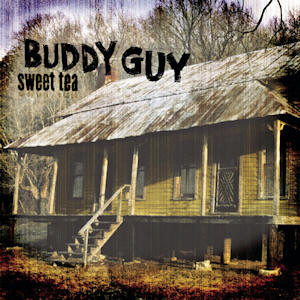 Jimbo: That was
the next move. I was called to do that. The whole while
I'm doing the Squirrel Nut Zippers and of course studying
all the jazz and swing and early American music, Stephen
Foster, also studying Robert Johnson and learning Charlie Patton
licks, continuing my blues and country education. While not
being with the Zippers I had
people I would pick with and we would just do the stuff I
liked and grew up with. I was recommended for the job to do
the
'Sweet Tea' album
[see
note (1) below]
and so I had no official history in the
blues but it was just a producer who had worked with me,
maybe he'd heard me practicing or knew me and said "Jimbo
would be perfect for this job" to basically translate the
primitive hill country blues sound, be the translator and
the formulator of the music to Buddy which was not his
thing. He had the show bands and the Chicago sound with the
horn sections and keyboards and big bands so they knew I
could communicate with older musicians, with black, white,
anything, you know. Well, Dennis Herring, the producer, called me the
'spark plug', but I had experience with the older black cats,
I knew how they worked and just from being around them, from
taking T Model Ford on tour with the Squirrels for a year so
he was our opening act for a year. I knew Spam (T
Model Ford’s long-time percussionist), I knew
Robert Belfour and being around all these guys on the road,
I would just ride in the van with them. Spam was part of
the key of Sweet Tea with his beats. He was a special
dude, you know man, not everybody can talk to Spam, or not
everybody could understand him, but I could and so he hired
me for different reasons and then it ended up being one of
the most phenomenal records. Jimbo: That was
the next move. I was called to do that. The whole while
I'm doing the Squirrel Nut Zippers and of course studying
all the jazz and swing and early American music, Stephen
Foster, also studying Robert Johnson and learning Charlie Patton
licks, continuing my blues and country education. While not
being with the Zippers I had
people I would pick with and we would just do the stuff I
liked and grew up with. I was recommended for the job to do
the
'Sweet Tea' album
[see
note (1) below]
and so I had no official history in the
blues but it was just a producer who had worked with me,
maybe he'd heard me practicing or knew me and said "Jimbo
would be perfect for this job" to basically translate the
primitive hill country blues sound, be the translator and
the formulator of the music to Buddy which was not his
thing. He had the show bands and the Chicago sound with the
horn sections and keyboards and big bands so they knew I
could communicate with older musicians, with black, white,
anything, you know. Well, Dennis Herring, the producer, called me the
'spark plug', but I had experience with the older black cats,
I knew how they worked and just from being around them, from
taking T Model Ford on tour with the Squirrels for a year so
he was our opening act for a year. I knew Spam (T
Model Ford’s long-time percussionist), I knew
Robert Belfour and being around all these guys on the road,
I would just ride in the van with them. Spam was part of
the key of Sweet Tea with his beats. He was a special
dude, you know man, not everybody can talk to Spam, or not
everybody could understand him, but I could and so he hired
me for different reasons and then it ended up being one of
the most phenomenal records.
Alan:
Talking of records, back in 1997 you recorded the album 'Play Songs for Rosetta'
[see note (2) below] in aid of your
childhood nanny Rosetta Patton
[see note (3) below]. The daughter of
Charlie Patton? Tell me more.
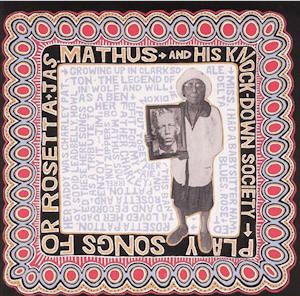 Jimbo: Yes, the
only child of Charlie Patton. She was my nanny in the
Delta, she worked for my family. Jimbo: Yes, the
only child of Charlie Patton. She was my nanny in the
Delta, she worked for my family.
Alan:
Did
she talk about him?
Jimbo: Nooooo,
noooo, noooo.
She would have been the opposite. She was a church-going
woman you know, she would never brag about her father who
was a musician, gambling houses, whore houses, alcohol,
bootlegging places, died early. She would never, ever have
thought to mention that ever because it was literally the devil's
music and she goes to the Pleasant Valley Baptist Church in
Duncan, Mississippi, so it wasn't until the mid 1990s, well
right before the Rosetta record came out that it was
disclosed and it was found out that Rosetta was Charlie
Patton's daughter. The way that happened was that a small
Japanese record label had tracked her down and brought her a
little royalty cheque from some Charlie Patton records that
they were selling in Japan. So these Japanese people came
to her house, which is as big as this room with a little
fence and a little clothes line. This bus of Japanese people
come up and knock on her door, little Rosetta is in her
house coat and house shoes and they give her a cheque
because of her Dad's music. Well of course the word got
around and then it got back to me and I was just stunned.
So it just really turned my world around, it gave me
courage. I don't think I would ever have had the courage
to publicly perform any blues music, I didn't go to jam
sessions, that was a private thing for me because I always
thought that was a black culture and I don't wanna not do it
right. You know? I don't want to tamper with that, it's
perfect, I can listen to it, I can practice it and enjoy it
but I was emboldened by that revelation to realise that I
was this close to Charlie Patton my whole life. She was in
the family, she had a stroke and then I thought I'm having
some success, at about the same time I met Luther and Jim
Dickinson. They heard me playing, heard the songs I was
writing and said, "Man, you've got to do this. You've got
to play these types of songs" and so it gave me a good
excuse to do it, a good reason, and then being emboldened by
the whole revelation it just took off from there and I
thought, this is a good time for me to go ahead and stake
out my territory because I may be known for Squirrel Nut
Zippers the rest of my life but I'm gonna let people know
right now, in 1996, this is where I'm at and I'm glad that I
ended up doing that.
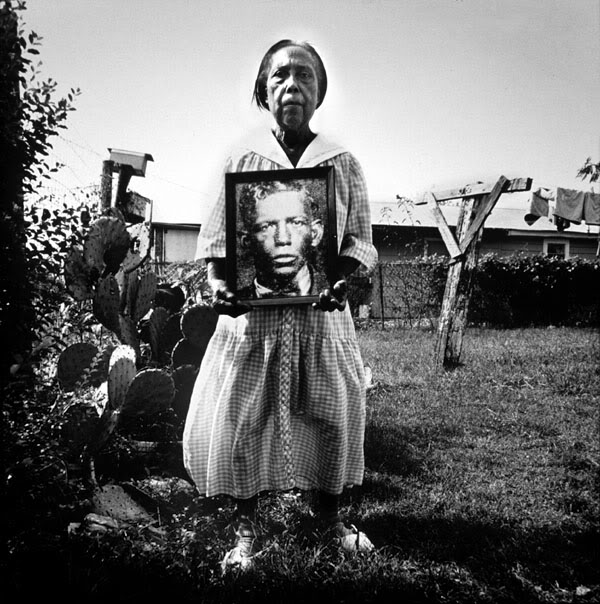
Rosetta
Patton Brown, holding a copy of the only known photo of her
famous father,
standing in the front yard of her home in Duncan,
Mississippi, 1996
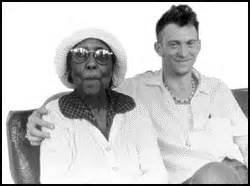
Jimbo
with Rosetta
Alan:
How
did you first come across the Dickinsons and Alvin
Youngblood Heart?
Jimbo:
'Gutbucket', the Dickinsons had a jug band when they were
teenagers in
High School and they opened for the Squirrel Nut Zippers in
Memphis when we were travelling through, so there's Luther
on slide guitar, Cody on washboard and he blows a jug too, and
Paul Taylor on string bass, a tub bass. I met em there and
Luther and I just fired up a friendship on the spot and
we've been collaborators ever since. That was about '95 I
think.
 Alan:
So in
2010 you helped form the South Memphis String Band with
Luther and Alvin. Alan:
So in
2010 you helped form the South Memphis String Band with
Luther and Alvin.
Jimbo: Yes, I
met Alvin through Jim Dickinson because I was going back
to Memphis a lot to record with Jim and to
visit Luther and to do festivals and do my Catfish
Mississippi music. Jim produced Alvin's 'Start with
The Soul' album
and that's how I met Alvin. So we'd play the same festivals
and we'd talk about fishing and stuff and we're both from
the country, we have similar backgrounds on the boats and
with hunting, fishing so we never talk about music!
Alan:
Tell
me about your current band, Tri-State Coalition.
Jimbo: Yeah
man, that's my band in the States and it's just a good
versatile band that we can do everything; they can handle my
original stuff that I write and other stuff. I like to do a lot of covers
when I'm playing around the South; I play a lot of dances
and a lot of social events and so we need to play Little
Richard and dance music, Johnny Cash, play stuff people like and
I really enjoy that so it's not always about my songs. We
just do the canon and it's just good cats I keep around me.
They are really good cats.
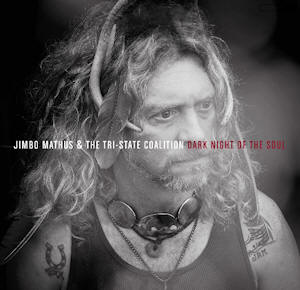 Alan:
Tell
me about your new album, 'Dark Night of the Soul'
with the Tri-State Coalition. Are all the tracks originals? Alan:
Tell
me about your new album, 'Dark Night of the Soul'
with the Tri-State Coalition. Are all the tracks originals?
Jimbo: Oh yes,
all originals. All the records I do, because I'm a writer
first and foremost, I'm not a flashy cat man you know what
I'm saying, I'm a journeyman musician. The guitar's like a
hammer, the banjo's like a level, it's a way to build things
but writing is what I am, I'm writing constantly. I'm a poet, a writer, I've done
just as much time on literature and on poetry and history as
I have on music. They are equal to me.
Alan:
Are
there any particular songs you have written that have
special meaning to you?
Jimbo: Oh my
God, yes. Every one! Even going back to the Squirrel Nut
Zippers I had one 'If it's good enough for Grandad, it's
good enough for me'. I've written a song about
everybody in my family. 'Tennessee Walker Mare' that's about my mother;
'Jimmy the Kid' is about my father; I've written about the
closest things in my life. I'm always asked to play at
funerals, wakes and events like that which are important to
families. I couldn't name one, they are all very personal
and I put a lot of soul and heart into what I write.
Alan:
You
are currently part of a UK tour with Ian Siegal. How did that come
about?
Jimbo: I met
him through the Dickinsons and he was down there last year
and Luther calls me when he's got some cool projects and he
wants me to come and do session work and knows that Jimbo's
who you need.
Alan:
I'll bet you
hit it off with Ian alright.
Jimbo: Hell,
yes, I just met him for a few hours, we did the session but
we cut it fast. One take, that's it. So we did that and I
didn't hear anything else from him, then I got an email from
him around January last year and he said would you like to
come over, I'm putting this CD out, Picnic Sessions,
you're on it so would you like to come and tour with me. I'll pay you
this much and I said, "Sign me up". So I really just met
him again a few days ago but we are getting along famously.
He's like a soul brother to me.
Alan:
You've had some sell-out audiences so far?
Jimbo: Every
night so far. He's a brilliant cat, he's smart, he's funny
and he's just a wonderful cat.
Alan:
He's
well appreciated here as well.
Jimbo: I'm so
glad.
Alan:
So what are your future plans in terms of tours,gigs,
albums.
Jimbo: I'm
working on a new one now, on the Fat Possum label and I've
already got 30 songs demo'd for the new record. It's going
to be coming out in April/May 2015, so I've got the support of
Fat Possum and so they are pushing me and are wanting to
keep promoting me and spreading the word about what I'm
doing, there's no stopping!
Alan:
Thank you
Jimbo and have a great tour with Ian.
|